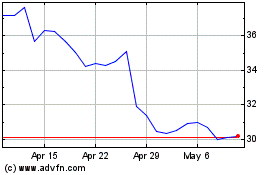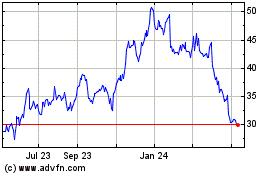This article is being republished as part of our daily
reproduction of WSJ.com articles that also appeared in the U.S.
print edition of The Wall Street Journal (March 13, 2018).
White House says proposed takeover of Qualcomm would pose
security threat
By Kate O'Keeffe
President Donald Trump on Monday blocked Broadcom Ltd.'s $117
billion hostile bid for Qualcomm Inc., capping a remarkable series
of moves by the Trump administration reflecting officials' concerns
about an intensifying arms race between the U.S. and China over
advanced technologies.
While Broadcom is a Singapore-based company, the U.S. panel that
vets foreign deals said that the bid could have had implications
for the U.S.'s broader technological competition with China. That
panel, the Committee on Foreign Investment in the U.S., known as
CFIUS, said it was worried that Broadcom would stymie research and
development at Qualcomm given its reputation as a cost-cutting
behemoth. CFIUS said such a move could weaken Qualcomm -- and
thereby the U.S. -- against foreign rivals racing to develop
next-generation wireless technology known as 5G, such as China's
Huawei Technologies Co.
Broadcom, which launched its hostile bid for Qualcomm in
November in what could have become the technology industry's
biggest-ever deal, was working to redomicile in the U.S. to evade
the panel's review. But the presidential order effectively ended
its acquisition hopes.
Broadcom, which has said it would invest in Qualcomm's 5G
technology if a deal went through, said late Monday it was
reviewing the order. "Broadcom strongly disagrees that its proposed
acquisition of Qualcomm raises any national security concerns," it
said in a statement.
"This decision is based on the facts and national security
sensitivities related to this particular transaction only,"
Treasury Secretary Steven Mnuchin, who chairs CFIUS, said in a
statement. He added that it "is not intended to make any other
statement about Broadcom or its employees, including its thousands
of hard working and highly skilled U.S. employees."
CFIUS has grown increasingly wary of any deals with potential
national-security ramifications linked to China -- and of any deal
makers the panel perceives to be trying to evade their review.
One of the key concerns CFIUS laid out about the Qualcomm bid
was Broadcom's "relationships with third party foreign entities and
the national security effects of Broadcom's business intentions
with respect to Qualcomm," according to a March 5 letter that a
CFIUS official wrote to the companies' lawyers that was disclosed
to the Securities and Exchange Commission.
"Given well-known U.S. national security concerns about Huawei
and other Chinese telecommunications companies, a shift to Chinese
dominance in 5G would have substantial negative national security
consequences for the United States," the letter says.
CFIUS was also concerned by Broadcom's efforts to expedite its
redomiciliation to the U.S. following the panel's decision March 4
to investigate its bid for Qualcomm. CFIUS had told lawyers for the
companies in a letter dated Sunday that Broadcom had repeatedly
violated its order to provide the panel with five days' notice
before taking any action on its redomiciliation plan. CFIUS also
said in the letter that its investigation of the bid "so far"
confirmed the national-security risks it had previously identified
with the proposed merger.
The last deal Mr. Trump blocked was Chinese government-backed
Canyon Bridge Capital Partners' attempt to buy Portland, Ore.-based
Lattice Semiconductor Corp.
The deal had become a lightning rod in a broader battle between
the U.S. and China over chip technology and foreign direct
investment more generally, and lawmakers had been watching closely.
A bipartisan group of 22 House members led by Rep. Robert Pittenger
(R., N.C.) -- who, along with Senate Majority Whip John Cornyn of
Texas has introduced a bill to expand CFIUS's jurisdiction -- wrote
to the panel in December 2016 to flag the transaction. The group
expressed concern that the deal could provide China with critical
technology and accused Canyon Bridge of initially trying to obscure
its Chinese-government backing, both of which the fund denied.
Mr. Trump blocked the deal in September after CFIUS said it
raised national-security concerns.
CFIUS's decision to review Broadcom's proposed bid came just
days before Qualcomm shareholders were set to vote on whether to
replace six of the company's 11 directors with nominees put forward
by Broadcom, a result that could have helped Broadcom achieve the
takeover.
The move had little precedent. Some private-sector lawyers who
specialize in CFIUS matters said the panel's decision to intervene
in the proposed deal before it was even signed -- and its rationale
for recommending against it, which included concerns over its
ramifications for U.S. competition with China -- represented an
abuse of the committee's powers as its reviews are focused purely
on national security issues.
The CFIUS panel itself had also initially been divided over
whether it had the right to commence its review before the deal was
signed, with representatives from the Departments of Justice,
Homeland Security, Defense and Energy urging CFIUS to begin its
review of the deal before Qualcomm shareholders went to vote on the
slate of directors that included Broadcom's nominees, according to
people familiar with the matter.
Broadcom appeared to be laying the groundwork to get ahead of
potential national-security concerns and to win favor with Mr.
Trump even before it launched its bid for Qualcomm.
Broadcom Chief Executive Hock Tan stood with Mr. Trump at the
White House in November to announce that Broadcom planned to
redomicile in the U.S. Mr. Trump called Mr. Tan "a great, great
executive" and said Broadcom was "one of the really great, great
companies."
Now, Mr. Trump's order leaves Broadcom little choice but to move
on. Broadcom's options are "not many, and not good," said Michael
Gershberg, an attorney with Fried, Frank, Harris, Shriver &
Jacobson LLP, who has experience with CFIUS cases. "There may be
avenues for the companies to work together in other kinds of
arrangements, but anything that looks like Broadcom controls
Qualcomm, especially around the 5G business, CFIUS will be alert
to."
Broadcom shares rose 3.6% Monday to $262.84, and Qualcomm fell
0.35% to $62.81.
--Cara Lombardo and Ted Greenwald contributed to this
article
Write to Kate O'Keeffe at kathryn.okeeffe@wsj.com
(END) Dow Jones Newswires
March 13, 2018 02:47 ET (06:47 GMT)
Copyright (c) 2018 Dow Jones & Company, Inc.
Intel (NASDAQ:INTC)
Historical Stock Chart
From Mar 2024 to Apr 2024

Intel (NASDAQ:INTC)
Historical Stock Chart
From Apr 2023 to Apr 2024
